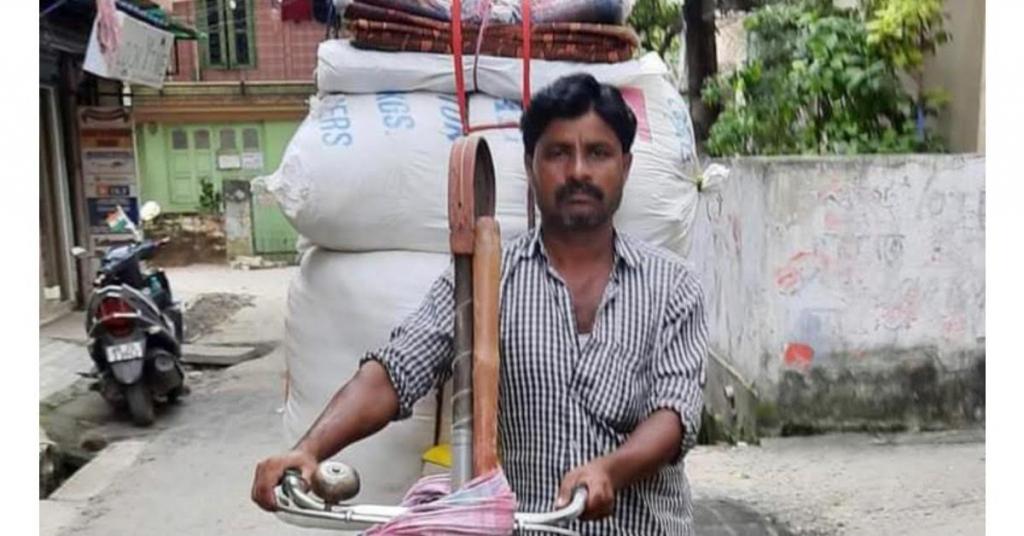As winter approaches in Bengal, with all its little extravagant traits – the pleasant dew particles on grass-leaves herald – the distant migratory birds coming back home – the winter crop – the winter festivities – the winter clothes. In most parts of North Bengal and many regions of North Bengal, it’s almost impossible to survive winters without thick woollen clothes – blankets – shawls. Until a few years ago, with the arrival of winter, a special kind of seasonal trader(s) called ‘Dhankur’ could be seen in most villages of Bengal. They used to travel from village to village and make blankets. Common people used to buy hand-made blankets from these Dhankurs. But come winter of 2022, these Dhankurs are slowly fading away, as is their business and very existence.
In today’s times, new clothing technology, and coats and blankets made of artificial wool, are readily available in the market at a cheaper price. As a result, the demand for hand-made blankets – or a hand woven sweater – is decreasing day by day. There was a time when these dhankurs used different types of cotton to make customised shawls and extravagant woollen gear. Those days, the demand for woollens made of carpus cotton, shimul cotton, white cotton, and kashful cotton was extremely high. Now that demand has slowly faded away.
CJP’s Grassroots Fellowship Program is a unique initiative aiming to give voice and agency to the young, from among the communities with whom we work closely. These presently include migrant workers, Dalits, Adivasis and forest workers. CJP Fellows report on issues closest to their hearts and home, and are making impactful change every day. We hope to expand this to include far reaching ethnicities, diverse genders, Muslim artisans, sanitation workers and manual scavengers. Our raison d’etre is to dot India’s vast landscape with the committed human rights workers who carry in their hearts Constitutional values, to transform India into what our nation’s founders dreamt it to be. Please Donate Now to increase the band of CJP Grassroot Fellows.
Najibul Islam, a craftsman and resident of Birbhum district says, “our business is not going strong, like it once used to. Synthetic blankets are available in the market. People are buying modern goods. Moreover, now there is no need for blanket filling and refurbishing, which used to be a large part of our business. Apart from this, shimul cotton costs 450 to 500 rupees per kg, carpus cotton 350 to 400 rupees per kg, black hull costs 150 to 200 rupees per kg. Depending on the size of the woven cloth commissioned, the wages generated are only about 300 to 1000 rupees. Currently, it costs around 2500 rupees to make a good quality coat and about 3500 rupees to make a good quality mattress. It is not economically feasible for us.”
Many dhankurs have left the business of their forefathers and mothers, the Dhankurs and focused on other businesses. The only reason for the shift in this profession is lack of profit. These once-thriving-artisans are unable to compete with the new-age market of manufactured goods and synthetic materials. Now talented craftsmen like Najibul hope for some Government grants, and commissioned projects, that could benefit them and have a renewed outlook towards making beautiful woollen weaves that they are extremely skilful at. Till then, they would keep looking for new work to fulfil their day-to-day responsibilities.
If government were to showcase this special artisanal craft, in the world of the fashion and design, dhankur weaves could become the next exotica. For this however what is required is a special eye on this fast dying craft.
This report is part of CJP’s Grassroots Fellowship Program, and has been written by aspiring journalist and student activist Ripon Sheikh from Birbhum in West Bengal. In these reports Ripon looks at the people around him – migrant workers, the families they leave behind, agricultural labourers, women who do housework, rural artisans and young people, with a keen sense of compassion.
Meet CJP Grassroot Fellow Mohammed Ripon Sheikh
This young man, who has graduated with a B.Sc degree from Burdwan University, loves trivia. Sheikh’s passion to research and seek “unknown information about World History” has earned him many medals and trophies at various University and state-level Quiz championships, and youth festivals. Sheikh is a born orator and a natural community leader. He has the potential to represent his community, state and country at a global level one day. His immediate goal, however, is to find a job so he can support his parents.
RELATED:
When you buy earthen lamps, you light up a craftsperson’s home
Jute farmers, and their fields of gold
How Sunderban’s Honey Collectors fight all odds to earn their living

